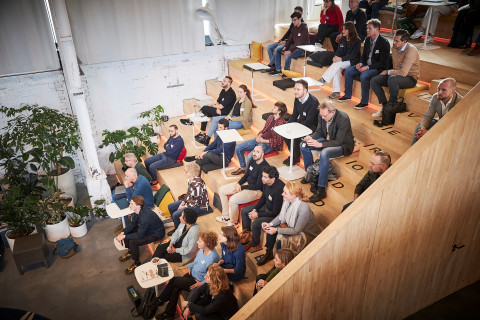The city of tomorrow is already being shaped by parties in the Amsterdam Smart City network. But a shared impact language when working together on transition challenges is missing. At the start of our new programme period, our partners have expressed their wishes to make the impact of our organisation, events and projects more measurable so that we can share and learn from each other. Our colleague Antonio Carretero (Amsterdam Economic Board) has developed an impact framework with four impact lenses that can help managing change in a different way. Together with partners Royal HaskoningDHV and Kennisland, Antonio led a workshop about how we can measure the impact of our network during the Demoday on March 23, 2023.
The Impact Framework
The impact framework is a broad forward-looking perspective and includes the various dimensions of impact: economic and sustainability impact, social issues, regional ecosystems and breakthroughs at the systems level. This framework can form the basis for a more shared impact language when working together on transitions. Below find an explanation of the four impact lenses developed by Amsterdam Economic Board:
- Lens 1: Economic and sustainability impact: The first lens focuses on the measurable impact on economy and sustainability in the region. Think of the phase-out of fossil fuels and the transition towards a green economy, with the reduction of CO2 as main goal.
- Lens 2: Social impact: Within the lens, social impact is central: how do projects and investments contribute to solving pressing social issues and well-being for residents? For this lens, the UN Sustainable Development Goals (SDGs) are a handy stepping stone to test interventions beforehand, but also to review impact afterwards.
- Lens 3: Strategic impact: The third lens looks at strategic impact from an ecosystem perspective: to what extent do interventions contribute to strengthening innovative ecosystems?
- Lens 4: System impact: With the fourth and final lens, we zoom out to the system level. How do interventions contribute to breaking down and building up systems?
Based on these four lenses, Antonio compiled a checklist with questions. To test the framework and checklist, we invited Marcel van Lieshout (municipality of Amsterdam) and Chris de Veer (province of North-Holland/Amsterdam Smart City), who are involved in the Mobility Challenge.
The case: Mobility Challenge
The Mobility Challenge is a coalition of partners who are working together to make CO2 neutral commute to and from the Johan Cruijff ArenA the norm. Using different types of measures, such as discouraging the use of cars, more bike parking, and group transport by bus, the partners are stimulating visitors to travel to the Johan Cruijff ArenA in a more sustainable way.
According to Antonio, the Impact framework provides three interesting perspectives for the mobility challenge:
- Lens 1: Economic & Sustainability impact: How can we determine the impact of all separate measures? How to start measuring, without it costing too much money or time? Currently, there is much unknown about how and from where visitors are travelling to the ArenA. We discussed an easy way to start measuring: with a questionnaire asking visitors about their commute via de Ajax app. In this way, we can create a baseline assessment.
- Lens 3: Strategic & Ecosystem impact: Which other parties should join, and what is the impact of that? It is important to think out-of-the-box when it comes to other potential partners. Think of area development and environmental parties who know a lot about the infrastructure developments in the area.
- Lens 4: System impact: How can we make CO2 neutral commute the norm and learn from this initiative? How can it become the ‘new normal’? The participants discussed how we can collect and share the learnings, and how we can learn from the cooperation as a network. It was also recommended work together with other events in the city, for example SAIL.
Next steps
In the coming months, we will further develop the Impact framework for the Amsterdam Smart City network. To do so, he will use the Mobility Challenge as a case to test the checklist and the framework. Additionally we will use the impact lenses to sharpen questions or projects brought in by partners, and (internally) map the impact of our tools. Do you have any input, or do you want to know more? Let us know in the comments.





